13 Jun 13 | Americas
In recent weeks Brazil has seen something unusual – large demonstrations on the streets of São Paulo and Rio de Janeiro. Rafael Spuldar reports on the rise in bus fares that is prompting the protests
So far this month there have been three major demonstrations in São Paulo and two in Rio. The national movement is coordinated by Movimento Passe Livre , or Free Pass Movement, which is comprised of groups linked to student organizations and leftist parties.
Bus fares increased on 1 June in both cities, jumping from 3 BRL ($1.42) to 3,20 BRL ($1.50) in São Paulo and from 2,75 ($1.30) to 2,95 ($1.40) in Rio. That’s a tough sell in Brazil where the monthly minimum wage of 700 BRL means that a low-wage worker in São Paulo could end up spending a third of their income on transportation.
On Tuesday, as many as 12,000 people marched from São Paulo’s Paulista Avenue area – considered to be the financial heart of South America’s richest city – to the city centre and back. Bus stops and subway stations were smashed during the protest. Riot police fired stun grenades and used tear gas against the protesters.
Some of the demonstrators posted photos and videos on social media denouncing police abuse. They were also critical of media reporting about the events, saying they are portrayed merely as vandals.
Twenty people were taken into custody during the demonstrations. One of them was reporter Leandro Machado from Folha de S.Paulo, Brazil’s biggest daily newspaper. Machado says he was taken by the police – along with a photographer – simply for reporting the arrest of a protester.
Journalist Pedro Nogueira from Portal Aprendiz – an education website – was also arrested while reporting on the protest. Nogueira says he was detained and beaten by the police while trying to help two friends, who were also attacked by policemen. A video posted on YouTube allegedly shows the incident.
In Rio, the latest demonstration took place on Monday evening. Riot police used mace and stun grenades against the protestors after they blocked Avenida Brasil, one of Rio’s main avenues. More than 30 people were taken in custody, many of them young. As in São Paulo, demonstrators used social media to post videos denouncing police excesses against participants.
Protests against bus fares, as well as clashes between demonstrators and the police, took place in other Brazilian capitals like Goiânia and Natal. In Goiânia, the fare rise was reversed by a court ruling.
Violent protests are not a common event in Brazil’s biggest urban areas. In recent days, social media users seem to be divided between supporters and those who denounce the protesters as vandals who damage public property and disrupt traffic.
The latest demonstrations follow successful movements that sought to roll back fare increases in late March in Porto Alegre – capital of southern state of Rio Grande do Sul. There the mayor revoked the rise.
At this week’s protests, demonstrators could be heard chanting “vamos repetir Porto Alegre” (“let’s repeat Porto Alegre”) in São Paulo and Rio.
Rafael Spuldar is a São Paulo-based writer and editor. Follow him on Twitter @spuldar
13 Jun 13 | United Kingdom
The Justice Minister has said defamation reform will be fully in place within six months. Padraig Reidy reports (more…)
13 Jun 13 | Digital Freedom, Europe and Central Asia
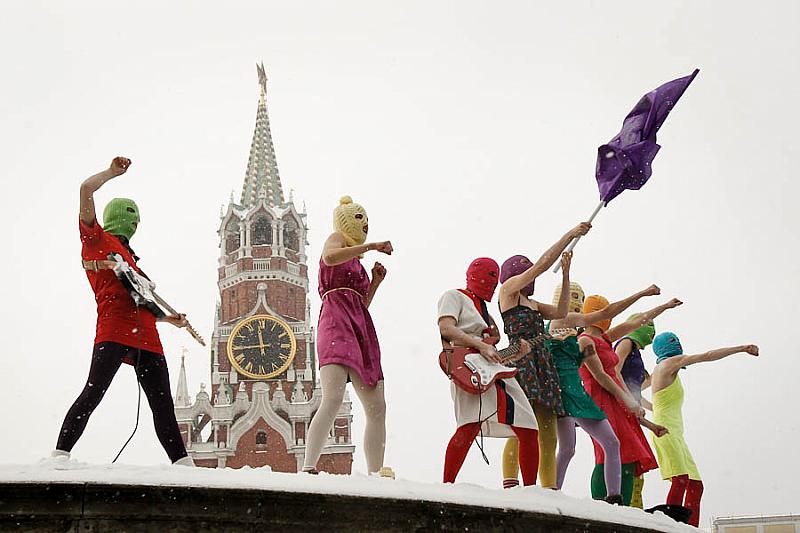
Pussy Riot – videos of their “Punk Prayer” protest are blocked by Russian authorities
April saw a bizarre variety of sites blocked by the Russian authorities or internet service providers – among them Pussy Riot videos, Wikipedia, the Yandex search engine, Blogger blogs, sites promoting bribery and corruption, sites of land developers and the humorous anti-encyclopaedia Absurdopedia (the Russian version of Uncyclopedia). Even the parody website Gospoisk (gossearch.ru) was blocked. The site is a fake search engine, ostensibly created with government support: when a visitor types a query in the search box, he or she is asked to enter his first and last name, patronymic, passport details, address and the reason for the request. Compiled by Andrei Soldatov
(more…)
13 Jun 13 | In the News
AUSTRALIA
WA premier denies censorship over PM event
THE West Australian government scuppered the venue booking for a Labor fundraiser featuring Prime Minister Julia Gillard, but claims it was not political censorship.
(Herald Sun)
BELARUS
The first rule of dictator club…
Belarus’s president Alexander Lukashenko will be able to count on some “like-minded” friends when it comes to a vote on his human rights record at the UN this week. Andrei Aliaksandrau reports
(Index on Censorship)
Belarus tries opposition activist for treason
An oil refinery mechanic went on trial in Belarus on Wednesday on treason charges after the government said it had foiled his attempt to pass information to foreign powers.
(Business Recorder)
BULGARIA
Bulgaria’s Ex PM Launched ‘Spate’ of Libel Lawsuits
Boyko Borisov, former Prime Minister and current leader of center-right party Citizens for European Development of Bulgaria, GERB, has informed that he has launched a number of libel lawsuits, with plans to use the proceeds for charity.
(Novinite.com)
CANADA
Ashley Madison repeats ‘censorship’ cry as CougarLife jokes canned in Canada
CougarLife.com is crying “censorship” over an ad in which a busty woman runs roughshod over younger women in a bar while explaining why cougars are better dates, because a Canadian regulatory body—the Television Bureau of Canada—has ordered that it can’t be aired unless the sandwich-shoving and the chair-pushing shots are removed.
(Novinite.com)
GREECE
Greeks protest public broadcast closure
It happened so quickly, few people inside Greece, and fewer watching from outside could comprehend it. Antonis Samaras, prime minister and leader of the Greek coalition government, announced that the state TV channel ERT, the equivalent of the BBC, would be shut down from midnight on 11 June. Dawn Foster reports.
(Reuters)
HUNGARY
Analysis: Divided EU in a bind over Hungary’s ‘erring’ Orban
Europe is in a bind over what to do about Hungary and a feeling that the former Soviet satellite is drifting back towards authoritarianism under Prime Minister Viktor Orban.
(Reuters)
INDIA
Caught in a web of censorship
Deepesh T. is only one feature film old but he is already feeling the heat of censorship. As a teacher of drawing at CHMHS, Thillankeri in Kannur, he always exhorts students to speak the truth. The filmmaker in him is no different.
(The Hindu)
PAKISTAN
Internet Censorship in Pakistan
As the people of Pakistan celebrate a historic turning point, the first successful transfer of power from one civilian government to other in the nation’s 65-year history, the country faces numerous challenges in the road to development and democracy.
(Voice of Journalists)
PHILIPPINES
Pugad Baboy and freedom of expression
There appears to be some misunderstanding on the nature of freedom of expression lately.
(Manila Standard)
RUSSIA
Anti-gay law passes in Russia
New legislation against “homosexual propaganda” has been passed against backdrop of piousness and machismo of Putinism, says Padraig Reidy
(Index on Censorship)
Russia introduces jail terms for ‘religious offenders’
A controversial law introducing jail sentences for the crime of offending religious believers was approved by Russia’s lower house of parliament on Tuesday.
(The Telegraph)
TUNISIA
Tunisia jails three Europeans for topless feminist protest
A Tunisian court sentenced three European feminist activists to four months in jail on Wednesday after they demonstrated topless in central Tunis last month against the Islamist-led government, one of their lawyers said.
(Reuters)
TURKEY
Turkey’s Taksim Square cleared after violent clashes
In a bid to gain control of Taksim Square, Turkish security forces last night clashed with antigovernment protesters camped out in Istanbul’s centre. Sara Yasin reports
(Index on Censorship)
US cautions Turkey on ‘punishing protesters exercising their right to free speech’
The United States on June 15 cautioned Turkish authorities against seeking to punish any demonstrators merely for exercising their right to free speech in the latest of several statements that have been addressed during the ongoing Gezi Park protests.
(Hurriyet Daily News)
Turkey’s history of military coups hangs over protests
Turkey’s “pashas”, the generals who once made politicians quake at the mere hint of disapproval, are staying silent as riots sweep the nation. Today the words “military coup” are nowhere to be heard, a tribute perhaps to the prime minister now accused of trampling on democracy.
(Reuters)
UNITED KINGDOM
Prism surveillance: spies thrive in the internet’s legal free-for-all
MPs almost wear their technophobia with pride. No wonder William Hague faced no serious questioning in the Commons
(The Guardian)
Drug laws amount to scientific censorship, says David Nutt
Former government adviser says illegal status of psychoactive drugs stymies research into their potential therapeutic uses
(The Guardian)
‘This rigmarole feels wrong,’ says journalist at centre of free speech row
Ahead of his talk about the Church of Scientology at the Senedd on Monday, BBC Panorama journalist John Sweeney says Cardiff council’s decision not to allow him to speak at Cardiff Library is a matter of free speech
(Wales Online)
Out of order! Speaker’s wife Sally sells furniture on eBay from flat in Parliament
Sally Bercow has blundered into controversy again – by flogging antiques from her free home in Parliament.
(Daily Mail)
UNITED STATES
Free speech outside Supreme Court: Ban on protests in plaza struck down
A 60-year-old statute barring all protest on the marble plaza outside the US Supreme Court is ‘irreconcilable with the First Amendment,’ a federal judge in Washington ruled.
(The Christian Science Monitor)
Fleming proposal to require free religious expression in military draws White House objections
The Obama administration is objecting to a proposed amendment by Rep. John Fleming, R-Minden, that would require the military to accommodate, except in cases of military necessity, “actions and speech” reflecting the “conscience, moral principles, or religious beliefs of the member.”
(The Times-Picayune)
Believers, nonbelievers vent over religious expressions during graduation
Graduation, religion and free speech combined for the perfect storm at the conclusion of the 2013 high school year.
(Deseret News)
PRISM Class-Action Lawsuit Filed: $20B, Injunction Sought Against ‘Complicit’ Companies and Officials
Lawsuit says Obama chilled free speech; attorney encourages citizens to ‘man the barricades of freedom’
(US News and World Report)
Snowden saw what I saw: surveillance criminally subverting the constitution
What Edward Snowden has done is an amazingly brave and courageous act of civil disobedience.
(The Guardian)
EDITORIAL: Trampling free speech
In a surveillance society, it’s wise to watch your words. A careless, offhand remark on Facebook can be grounds for a sacking or even probable cause for arrest, just for speaking your piece.
(The Washington Times)
Spies Without Borders I: Using Domestic Networks to Spy on the World
Much of the U.S. media coverage of last week’s NSA revelations has concentrated on its impact on the constitutional rights of U.S.-based Internet users. But what about the billions of Internet users around the world whose private information is stored on U.S. servers, or whose data travels across U.S. networks or is otherwise accessible through them?
(EFF)
12 Jun 13 | Europe and Central Asia
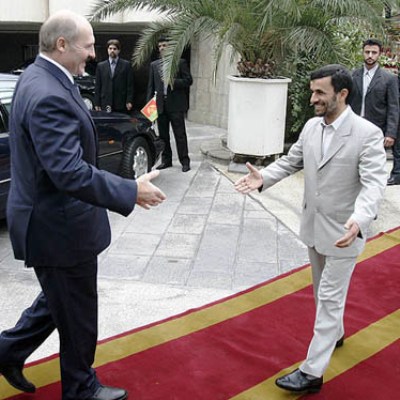 Belarus’s dictator Alexander Lukashenko will be able to count on some “like-minded” friends when it comes to a vote on his human rights record at the UN this week. Andrei Aliaksandrau reports
Belarus’s dictator Alexander Lukashenko will be able to count on some “like-minded” friends when it comes to a vote on his human rights record at the UN this week. Andrei Aliaksandrau reports
(more…)
12 Jun 13 | Europe and Central Asia, Turkey
In a bid to gain control of Taksim Square, Turkish security forces last night clashed with antigovernment protesters camped out in Istanbul’s centre. Sara Yasin reports
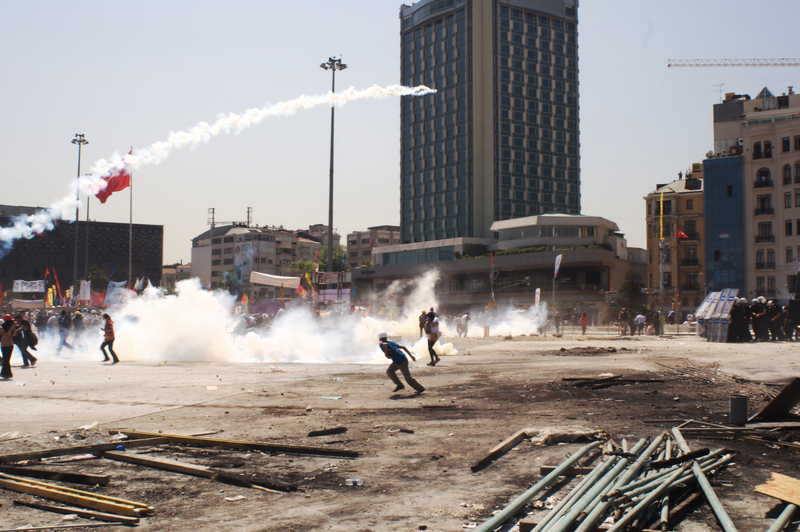 Riot police raided Istanbul’s Taksim Square last night, in efforts to implement promises of Turkish Prime Minister Recep Tayyip Erdoğan, who vowed to bring an end to anti-government protests. Bulldozers cleared out barricades in the square early this morning.
Riot police raided Istanbul’s Taksim Square last night, in efforts to implement promises of Turkish Prime Minister Recep Tayyip Erdoğan, who vowed to bring an end to anti-government protests. Bulldozers cleared out barricades in the square early this morning.
The square was the site of an overnight territorial battle between protesters and security forces, who fired tear gas, stun grenades, water cannons, and rubber bullets onto the crowd. In the 10 days since unrest began in the country, three have been killed, 600 police officers injured, and approximately 5,000 wounded according to the Turkish Medical Association.
On BBC Radio 5 live this morning, Index on Censorship CEO Kirsty Hughes said that Erdoğan’s response “has been increasingly heavy-handed, and not constructive and open towards demonstrators.”
“In the last 24 hours, and just overnight last night, he’s veered towards a very tough response, which I think is going to inflame the situation,” Hughes added.
Several hundred protesters remain camped out in the neighbouring Gezi Park, where protests were initially sparked over a plan to turn the green space into a shopping mall, which snowballed into countrywide protests against the current government.
Turkey’s Broadcasting Authority yesterday said that four stations will be fined for covering the unrest, accusing them of incitement to violence.
Addressing a crowd including Erdoğan in Istanbul this week, EU commssioner Štefan Füle was critical of the government’s violent crackdown on protesters, and called for a “swift and transparent” probe into the violence. He also said that countries wishing to gain entry to the European Union should “aspire to the highest possible democratic standards and practises.”
12 Jun 13 | Europe and Central Asia
New legislation against “homosexual propaganda” has been passed against backdrop of piousness and machismo of Putinism, says Padraig Reidy
(more…)
12 Jun 13 | Europe and Central Asia, Greece, News and features
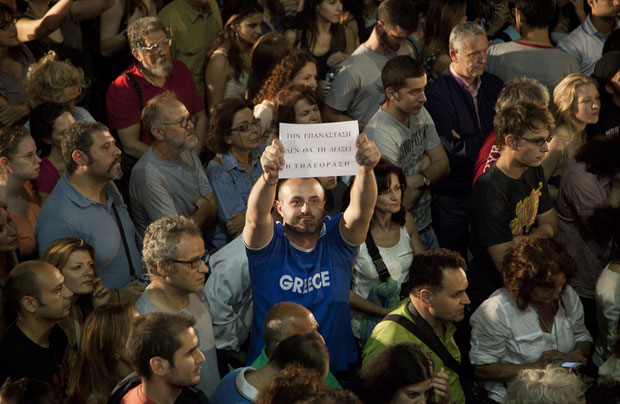
Greeks protested their government’s decision to shutter public broadcaster ERT. (Photo: MICHALIS MICHAILIDIS/Demotix)
It happened so quickly, few people inside Greece, and fewer watching from outside could comprehend it. Antonis Samaras, prime minister and leader of the Greek coalition government, announced that the state TV channel ERT, the equivalent of the BBC, would be shut down from midnight on 11 June. Dawn Foster reports.
The caveats provided little relief — Samaras claimed ERT would reopen, with far slimmer staffing levels than the current 2,656 journalists it currently employs across the country.
The plug would be pulled at midnight, Samaras announced a few hours before. Citizen journalists reported seeing riot police marching to transmitters, and ERT offices in Athens, Thessaloniki and beyond were surrounded by riot police, stopped only by the huge crowds of protestors who quickly thronged the streets in fury at the shock decision.
Index on Censorship Chief Executive Kirsty Hughes commented today: “The sudden closure of Greek public broadcaster ERT by the government shows an attitude to media freedom that is extremely troubling. Throughout the Greek economic crisis the authorities have been eager to shoot the messengers, whether they be ERT employees or Kostas Vaxevanis, publisher of the ‘Lagarde list’. Narrowing the discussion through undermining free media will not solve Greece’s problems”
ERT journalists responded by occupying their buildings, and continuing to transmit wherever possible. After years of criticism for often acting as little more than an adjunct of government communications, ERT journalists became vociferous in their criticism of politicians, and government policy. The economist Yanis Varoufakis, admitted live on air that he had been banned from appearing on ERT by a PASOK spokesperson after stating that Greece needed to restructure its debt:
“…as you know, your government bosses had me blacklisted from this station ever since I refused to keep quiet about Greece’s bankruptcy. That act of totalitarianism was a prelude to the much grosser one that we are experiencing tonight. Clearly, I am not the person to say that ERT was a splendid organisation unblemished by censorship, political interference or corruption. But I think I am the person possessing the moral authority to stand here tonight in front of you and say that, despite all its ills, the totalitarian manner in which ERT was closed down was a crime against all civilised people the world over.”
The president of the European Broadcasting Union, Jean Paul Philipott, roundly condemned Antonis Samaras’s decision and urged the Greek government to reverse the shutdown with immiediate effect noting: “The existence of public service media and their independence from government lie at the heart of democratic societies, and therefore any far-reaching changes to the public media system should only be decided after an open and inclusive democratic debate in Parliament — and not through a simple agreement between two government ministers.”
Samaras and New Democracy have attempted to justify the censorship of state broadcasting by arguing that the shutdown was necessary to meet public sector redundancy targets set by the Troika, due to be re-examined at the end of July.
For many Greeks, the closure carries memories of the junta. The military dictatorship’s rule is still within living memory of many Greeks, and blank screens were often a precursos to another coup. Several ERT journalists, and opposition leader Alexis Tsipras of SYRIZA referred to the move as a “coup”, a particularly loaded term in Greece. Tsipras told protesters assembled outside an ERT station “This is completely illegal … The government has overstepped its authority. You can’t do this without parliamentary approval, it’s an issue of democracy.”
ERT journalists broke ranks in their anger at the sudden clampdown, speakig candidly on air, and outside ERT buildings of the pressure to bring government ministers on air and silence dissenting voices.
Samaras’s decision to shut down ERT with force, and without consultation with coalition partners PASOK and Democratic Left, has been widely described as inherently undemocratic. It remains to be seen whether the row will force a political crisis in the coalition, or if it heralds much wider, and more drastic sackings across the Greek public sector.
Dawn Foster works for the Guardian’s Comment is Free. She tweets at @DawnHFoster
12 Jun 13 | In the News
AUSTRALIA
Art gallery raid threatens city’s image as creative enclave, says MP
A Victorian legislator says a rising tide of cultural conservatism in Melbourne is jeopardising artistic freedom
(The Guardian)
BRAZIL
Brazil’s natives step protests over land rights
Indigenous activists occupied the headquarters of a federal agency here Tuesday as part of mounting protests against government policies and the construction of a controversial dam in the Amazon.
(AFP)
BULGARIA
Bulgaria’s GERB to Sue Nationalist Leader For Libel
The Citizens for European Development of Bulgaria party, GERB, vowed to sue nationalist leader Volen Siderov for slander over his statement that notorious businessman Mihail Mihov had been killed to cover up ex- Prime Minister Boiko Borisov’s crimes.
(Novinite.com)
INDIA
VC Shukla, the face of press censorship during emergency, dies
VC Shukla, a close associate of late Sanjay Gandhi, not only cut power supply to printing presses but also used to monitor almost each and every story printed during his stint as I&B minister during the Emergency.
(Moneylife)
IRAN
Even Iran’s conservative media complain of filtering
Iran’s conservative media, including blogs and news websites, have been increasingly targeted by censors. The censorship has increased in the run-up to the June 14 presidential election.
(Turkish Weekly)
MALAYSIA
Free speech and education
The right to free speech is one of those rights that affirm the dignity of human beings as creatures of free will. It is every person’s birthright. There should therefore be no question of anyone having to demand it from some authority, as Malaysians have been doing for decades.
(Free Malaysia Today)
RUSSIA
Russia may deem civil servants’ use of Gmail, Facebook ‘high treason’
After the latest NSA surveillance revelations a Russian MP has suggested to the government to immediately limit civil servants’ access to the popular US internet services and social networks.
(RT)
A ‘dark day’ for freedom of expression in Russia
The space for free expression in Russia shrank further today after the State Duma in Moscow passed two new bills aimed at stamping out minority views, Amnesty International said.
(Amnesty International)
TUNISIA
People Reject Both Religious State and State At War Against Religion
Interim Prime Minister Ali Larayedh said the Tunisian government “is advocating neither for a religious State nor a State at war against religion.”
(AllAfrica.com)
UNITED STATES
European Union to tell US privacy ‘not a luxury’ after intelligence scandal
The European Union said Tuesday it will seek assurances from the United States that it will respect the rights of Europe’s citizens, following revelations about a huge US internet surveillance programme.
(Times of India)
Banning censorship of historical documents in schools to be considered by Michigan Senate committee
A pair of bills pending before the Senate Education Committee would mandate lessons on American history during “Constitution Week” and would prohibit any restrictions on or censorship of America’s “founding documents” by school administrators or teachers.
(MLive.com)
Colorado Booksellers Defeat Censorship Law
A week after Colorado booksellers challenged a law restricting the display of magazines about marijuana, the State of Colorado has agreed not to enforce it.
(Publishers Weekly)
Beware of libel risk when writing a memoir
DEAR MISS MANNERS: I’m writing a memoir and want to write honestly how I experienced incidents involving other persons, while including the caveat that the other persons may have felt very differently about the same incidents. I think these other people would rather I not write about them at all. Where does self-expression and one’s right to tell one’s memories end, and other people’s right not to be included in my written memories begin?
(Kansas City Star)
When anti-gay bullying and free speech collide
As Congress revisits federal education policy, gay rights activists are pressing for the enactment of the Student Non-Discrimination Act of 2013, which would prohibit harassment of students in public schools “on the basis of actual or perceived sexual orientation or gender identity.” Laws already on the books prohibit discrimination in public schools on the basis of race, color, national origin and gender. The new act would seem a natural extension.
(Los Angeles Times)
Displaying Ten Commandments in schools is part of ‘censorship’ bill in Michigan Legislature
A bill authorizing the display of the Ten Commandments in public schools alongside the U.S. Constitution and the Declaration of Independence was introduced in the Michigan Senate and will be debated by a Senate panel Wednesday.
(MLive.com)
A.C.L.U. Files Lawsuit Seeking to Stop the Collection of Domestic Phone Logs
The American Civil Liberties Union sued the Obama administration on Tuesday over its “dragnet” collection of logs of domestic phone calls, contending that the once-secret program — whose existence was exposed last week by a former National Security Agency contractor — is illegal and asking a judge to stop it and order the records purged.
(The New York Times)
VENEZUELA
Capriles Starts Internet TV Show to Skirt Venezuela ‘Censorship’
Venezuelan opposition leader Henrique Capriles Radonski started a weekly Internet television program today, after alleging that the country’s television stations and newspapers are squeezing him out of their coverage. (Bloomberg)
ZIMBABWE
Challenges in promoting privacy and freedom of expression in Zimbabwe
Report of the Special Rapporteur on the promotion and protection of the right to freedom of opinion and expression, Frank La Rue and its implications for Zimbabwe. (Nehanda Radio)
11 Jun 13 | Religion and Culture
Tennessee Department of Justice Attorney William Killian has recently raised eyebrows for suggesting that anti-Muslim messages online could be prosecuted under federal laws. Sara Yasin questions if his approach will help anyone
(more…)
11 Jun 13 | Digital Freedom
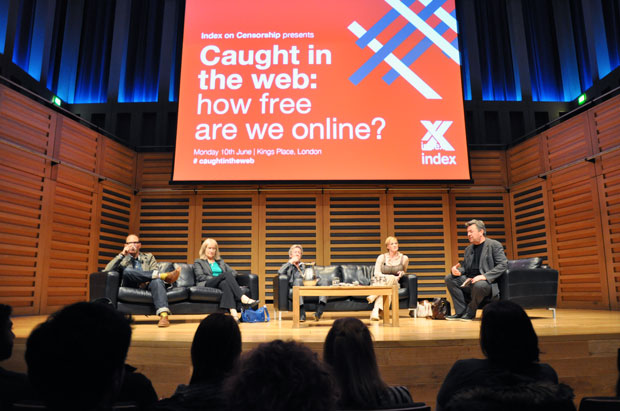
(Photo: Andrei Aliaksandru/Index on Censorship)
Against a backdrop of ongoing revelations around the US Prism programme, mass surveillance dominated the discussion at the Index on Censorship event Caught in the web: How free are we online? Brian Pellot reports
Index on Censorship brought together a panel of experts at King’s Place in London last night. Investigative journalist Heather Brooke, author and digital rights activist Cory Doctorow, media lawyer Paul Tweed, Index CEO Kirsty Hughes and chair David Aaronovitch discussed the threats to freedom of expression online.
Brooke, warned that as we increase our online expression, we “create a handy one-stop shop for snooping officials”. She also cautioned that concentrated power in secretive states is a far greater danger to humanity than unbridled free speech.
(Brooke, author of The Revolution will be Digitised, kindly joined the panel at the last minute, replacing Guardian data editor James Ball, who is currently in the US covering the developing Prism scandal)
Doctorow, co-founder of the hugely influential Boing Boing blog, said while he was pessimistic about the “Orwellian control” that digital technologies provide governments, he remains optimistic that such technologies can enable us to cooperate, coordinate and collaborate in unprecedented ways to seek positive social change.
Doctorow questioned the efficacy of overcollection of data, characterised by PRISM, saying that as an intelligence technique is “like pointing at a pixel with a hotdog”.
Belfast-based libel lawyer Tweed said that anonymity online enables speech that constitutes dangerous harassment. He argued that freedom of expression must be protected, but that controls are needed to prevent the undermining of reputation and privacy. He recounted examples from his practice of clients that are harassed and attacked on the web with very little recourse against “internet goliaths”.
“There has to be a button to protect the man on the street”, Tweed said.
Hughes discussed the emerging geopolitics of digital freedom, noting that while EU countries and the US are lobbying for the preservation of a multistakeholder model of internet governance, Russia, China and others are pushing for top-down government control. Some of the greatest threats to online freedom of expression she discussed are censorship in the form of firewalls and filters, laws criminalising offence, the privatisation of censorship and, of course, surveillance.
Aaronovitch fielded questions from audience members who were focused on government surveillance and censorship.
Doctorow claimed that web filters are a blunt and inefficient instrument, giving the example of Denmark’s secret child abuse filters, which leaks showed had blocked a huge amount of material that was not related to sexual imagery of children.
“Everyone knows web filters don’t work, but once used, removing them would be political suicide,” he said.
Brooke acknowledged that current laws are not keeping pace with technology but does not think new laws are the solution. More important is that “our fundamental values be translated into the digital age”, she said.
“Nothing to hide, nothing to fear is an arrogant statement”, Brooke commented on UK foreign secretary William Hague’s response to questions on PRISM on Sunday.
Hughes elaborated on a statement she made earlier in the day essentially saying that mass surveillance is an invasion of our right to privacy and a direct chill on free speech.
Index on Censorship has released a joint statement with English PEN, Privacy International and Open Rights Group condemning the use of national security to justify mass surveillance.
Let us know your thoughts on the Prism scandal by commenting below
Related:
• Pod Academy coverage of this event
11 Jun 13 | In the News
CANADA
Rob Ford wins partial costs in wake of failed libel suit
Boardwalk Pub restaurateur George Foulidis must pay mayor and Bruce Baker $137,000, judge ruled Monday. (Toronto Star)
CHINA
Beyond the Great Firewall: How and What China Censors
China’s lack of transparency has long posed a daunting challenge to outside observers trying to understand what the government’s interests, goals, and intentions are. Gary King, a Professor in Government at Harvard University, has provided telling new insights into these questions with his research on the government’s censorship of social media websites. (The Diplomat)
EGYPT
Maspero in crisis: report
The AFTE also claimed former head of the state-run TV sector Essam El-Amir resigned last December because of intervention in the coverage of the presidential palace clashes. (Daily News Egypt)
HONG KONG
Yes, Free Speech Is Big in Hong Kong—Because They Must Constantly Defend It
Hong Kong has a strong tradition of free speech.” That’s how Edward Snowden, the 29-year-old leaker who slammed National Security Agency surveillance as an “existential threat to democracy,” described his decision to flee to China. (New Republic)
RUSSIA
Accusations of censorship as more exhibitions are shut down at Perm festival
The White Nights festival in Perm has come under pressure after four of its exhibitions have been closed, seemingly at the request of unhappy local politicians. In response, Marat Guelman, one of the festival’s organisers has accused critics of political game-playing. (Calvert Journal)
UNITED STATES
Should the Lubbock AJ host Blogs?: Freedom of Speech Issues
In the spring of 2012 I was invited to begin a blog hosted on the Lubbock AJ on-line site. Having been drawn into the arena of public debate during the effort to close the city’s Health Department I felt that such an opportunity to encourage civic involvement was a good idea.
(Lubbock Avalanche-Journal)
‘Free Speech’ Doesn’t Include Showing Dead Fetus Posters to Kids
The Supreme Court refused to hear the appeal of an anti-abortion protestor who claimed his free speech was violated by the state of Colorado. By declining to hear the case, the Court allowed a lower court ruling barring certain types of anti-abortion protests in public areas to stand, which, on its surface, might sound like a good thing. But the truth’s a little messier.
(Jezebel)
As libel trial losers battle $1M legal bill, FBI probes claimed mid-trial DUI set-up of their lawyer
The trial in a defamation case between two radio shock jocks in Florida has been over for months. But there’s no end in sight to continuing issues involving the law firms for both sides, the Tampa Bay Times reports.
(ABA Journal)
A twist in the tale of the Christian valedictorian
You’ve probably heard about the South Carolina high school valedictorian who tore up his prepared speech at graduation ceremonies and instead recited the Lord’s Prayer, to cheers and applause. But there is a twist in the tale of Roy Costner IV, who has become a poster boy for Christian conservatives.
(Los Angeles Times)
VIETNAM
Vietnam bans action movie despite removal of violent scenes
Vietnam latest action movie about gang fights in Ho Chi Minh City’s Chinatown has been officially banned after the censors disapproved of the new, censored version. (Thanh Nien)

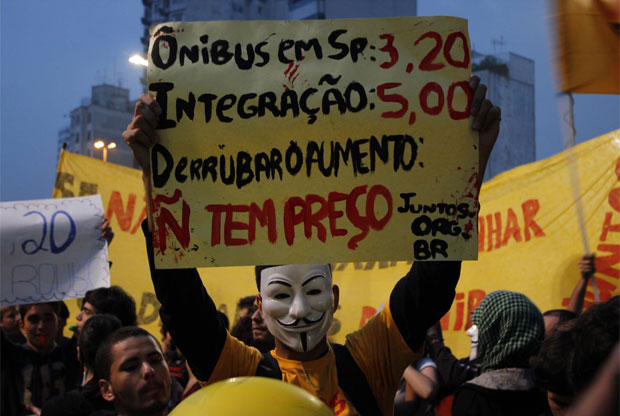


 Belarus’s dictator Alexander Lukashenko will be able to count on some “like-minded” friends when it comes to a vote on his human rights record at the UN this week. Andrei Aliaksandrau reports
Belarus’s dictator Alexander Lukashenko will be able to count on some “like-minded” friends when it comes to a vote on his human rights record at the UN this week. Andrei Aliaksandrau reports

